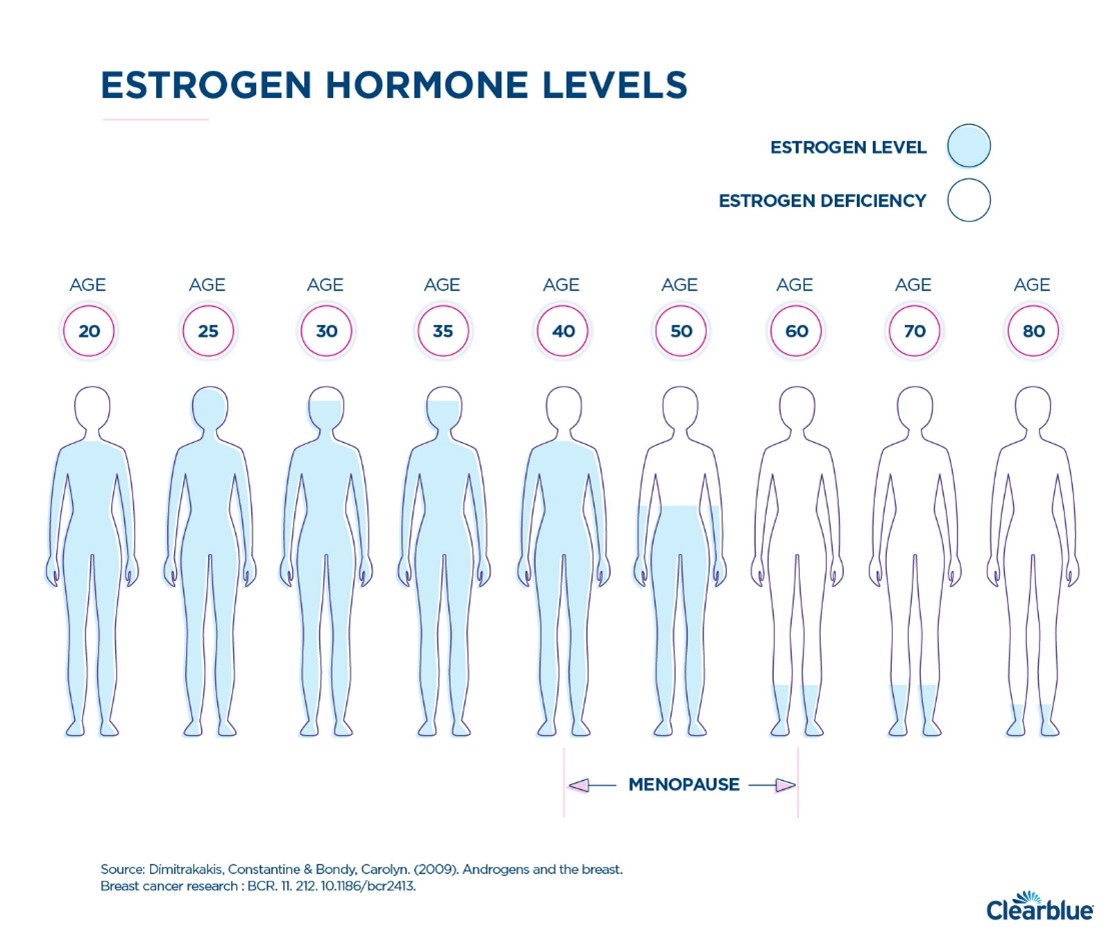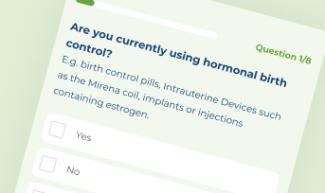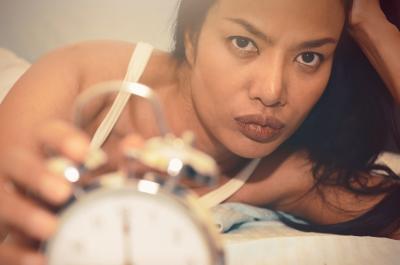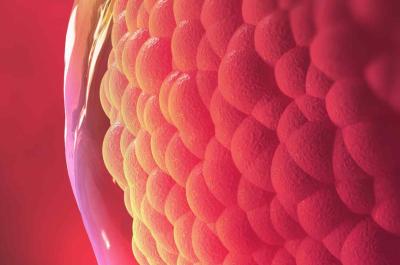
What is menopause? When does it start? And, what are the symptoms? If you’ve asked yourself these questions you’ve come to the right place to find out more.
In this article
- What is the definition of menopause?
- What happens during menopause?
- Why does menopause happen?
- Stages of menopause
- Symptoms of menopause
- Can there be any complications with menopause?
- Can menopause be diagnosed?
- Are there any ways to manage the symptoms of menopause?
- When to see a healthcare professional
- FAQs
- The bottom line
What is the definition of menopause?
When you think of menopause, chances are you think of a long transition with uncomfortable symptoms - perhaps even lasting years - before a woman’s period stops. However, what most people consider ‘the menopause’ is usually the phase known as perimenopause, which is the time leading up to the day a woman’s periods stop altogether. By definition, menopause refers to the single day when a woman hasn’t had a period in 12 consecutive months and can no longer get pregnant.
After this 12-month period, a woman is considered in postmenopause for the remainder of her life.
The average age menopause happens is 51, but typically it takes place somewhere between ages 45 and 55. It’s also possible for menopause to begin earlier for some women. Going through menopause aged 40 to 45 (which occurs in around 5% women) is referred to as ‘early menopause’. If menopause occurs in women under the age of 40, (extremely rare <1% women) it is called premature ovarian insufficiency (POI).
What happens during menopause?
A woman experiencing so-called ‘menopausal’ symptoms is often in perimenopause (peri means near or around). Perimenopause typically lasts 4 - 8 years, and one of the main signs of a woman being in perimenopause is that her menstrual periods start to become irregular.
When a woman approaches the end of her fertile time, estrogen levels begin to decline. This hormonal change begins to affect her menstrual cycles and she may start having either unusually light or heavy periods, or the frequency of her periods may change.
Women’s experiences around this time can be very different. Some may see their cycles get shorter at first, perhaps having a period every two to three weeks before skipping periods for several months. Other women can go from having regular cycles to having no periods at all quite suddenly. Irregular cycles or skipped periods could be one of the first signs of approaching menopause.
Although every woman’s menopause journey is unique, after a few months or years of disrupted menstrual cycles, periods do eventually stop altogether.

Why does menopause happen?
Menopause happens when your ovaries stop producing eggs.
For around 5% of women1, it’s possible for early menopause (under the age of 45) to happen. It’s also possible to go through premature menopause (under the age of 40), which is incredibly rare, as it affects only 1% of women.2 Experts aren’t quite sure why some women go through early or premature menopause, although it is likely to have a genetic cause. If your mother had an early menopause, you’re more likely, but not guaranteed, to go through menopause early also.
Sometimes early menopause can be triggered by:
- bilateral oophorectomy, which is when the ovaries are removed (surgical menopause)
- some breast cancer treatments, like chemotherapy or radiotherapy
- underlying conditions such as Down’s syndrome or Addison’s disease
Stages of menopause
Menopause doesn't just happen overnight, there are stages. Each stage helps your body adjust to the hormonal and physiological changes:
Premenopause
- The reproductive stage of your life after puberty where you are at your most fertile.
Early Perimenopause
- You will start to experience irregular cycles and may occasionally notice the length of your cycles can vary by 7 or more days between one cycle and the next. This is due to fluctuating follicle stimulating hormone (FSH) levels.
- Your periods may become heavier or lighter.
- You may start to experience some symptoms of perimenopause. Some women note changes in mood, including anxiety, or irritability. Other frequent symptoms include sleeping problems and headaches.3
Late Perimenopause
- This is the stage in which you can sometimes have 60 days or more between your periods. This stage can typically last between one and three years.
- You will have more cycles where you do not release an egg (anovulation) compared to previous stages.
- Your FSH levels will become consistently elevated and you will be more likely to suffer from vasomotor symptoms such as hot flashes and night sweats (50 - 82% of women in the US experience vasomotor symptoms4).
Menopause
- Menopause actually refers to a single day; the day that marks 12 months since your last period.
- The menopause stages leading up to this can typically last between 4-8 years.
Postmenopause
- Once you have passed menopause you are no longer releasing eggs and are no longer fertile. Always see a healthcare professional to confirm, before making any decisions about your birth control.
- You may still experience symptoms, as these can take four or more years after menopause to stop entirely, though usually lessen with time.
Symptoms of menopause
Menopause affects every woman differently. You may have very mild or even no symptoms at all, or they could be severe.
The most common symptoms of menopause—can include:
- Vasomotor symptoms
- Hot flashes - sudden and short bursts of heat that usually occur in the face, neck, and chest, which can also make your skin red and sweaty
- Night sweats - when you sweat so much that your night clothes and bedding are soaking wet
- Palpitations - you may notice your heartbeat becomes more noticeable
- Sexual symptoms
- Vaginal dryness - may also be accompanied by pain, itching, or discomfort during sex
- Reduced sex drive
- Physical symptoms
- Joint stiffness, aches, and pains
- Sleeping difficulties - you may be kept awake by hot flashes, night sweats, or just have trouble sleeping, either way this may leave you feeling tired and irritable during the day
- Headaches
- Psychological symptoms
- Anxiety
- Mood changes
- Memory and concentration problems
It’s been reported that 85% of women will have some of the above symptoms of menopause before and after their periods stop.5 Symptoms can appear months or years before your periods actually stop altogether and can last around four or more after your last period.
Can there be any complications with menopause?
It’s possible for complications associated with menopause to happen, such as:
- vulvovaginal atrophy - when the walls of the vagina thin
- painful intercourse - can be sharp or intense pain in the genital or pelvic area during, before, or after sex
- slower metabolism - burning fewer calories at rest than before, which can lead to weight gain
- osteoporosis - weakened bones with reduced strength and mass
- cataracts - a dense, cloudy area that forms in the lens of the eye
- periodontal disease - an infection of the gums
- urinary incontinence - the sudden and involuntary urge to urinate
- heart or blood vessel disease
Talk to your healthcare professional about how lifestyle changes, hormone replacement therapy (HRT) or other medications that are available could help reduce your risks of any of these potential complications.
Can menopause be diagnosed?
A diagnosis for menopause is made when you’ve gone 12 consecutive months without a period. Your healthcare professional may diagnose you’re entering perimenopause if you have the symptoms of menopause. If you are experiencing irregular periods or hot flashes and are concerned about it - especially if you are younger than 45 - ask your healthcare professional for an evaluation.
Most of the time your healthcare professional will use symptoms to make a menopause diagnosis, but in certain circumstances (for example, if early menopause is suspected), you may be offered a blood test. This test checks:
- the levels of follicle-stimulating hormone (FSH), which goes up, and estrogen, which decreases, during menopause
- the levels of thyroid-stimulating hormone (TSH) because an underactive thyroid can cause similar symptoms to that of menopause

Is Clearblue® Menopause Stage Indicator right for me?
Take our simple quiz to find out!
Are there any ways to manage the symptoms of menopause?
Once you’ve passed through menopause, you can’t reverse menopause itself and regain your fertility, but there are things you can do that make living with the symptoms easier. There are a few way to manage your healthcare professional may recommend, lifestyle changes you can make, and home remedies you may wish to try that can help reduce any uncomfortable symptoms that may accompany menopause (or rather perimenopause). Read on to discover more about these.
Management of menopause-related symptoms
If the symptoms you get before, during, or after menopause interfere with your daily life, your healthcare professional may recommend certain things like:
- Hormone replacement therapy (HRT). This type of therapy comes in the form of tablets, skin patches, gels, or implants. HRT helps with the symptoms of menopause as it replaces the estrogen that’s no longer produced by the body. There are numerous benefits to HRT—for example, it can help prevent osteoporosis—so talk to your healthcare professional about the risks and benefits of HRT, and how it could help you
- Vaginal estrogen creams, lubricants, or moisturisers to help with vaginal dryness
- Cognitive behavioural therapy (CBT). This can help deal with any mood changes or increased anxiety associated with menopause
- Supplements like Vitamin D and Calcium. Taking supplements like Vitamin D and Calcium can help keep your bones healthy
In some cases, your healthcare professional may refer you to a specialist if you cannot take HRT or your symptoms do not improve.
Lifestyle changes
There are a few lifestyle changes you can make that may help some of the symptoms improve:
- Exercise regularly - weight-bearing and resistance training can help against osteoporosis and exercise can also help with mood changes
- Follow a healthy diet - a diet with plenty of fruit and veg, and dairy products like low-fat milk and yoghurt can help with weak bones and promote your overall health
- Get some sunlight - sunlight triggers the production of Vitamin D, which can also help keep bones strong. Your healthcare professional may also recommend you take a Vitamin D supplement to ensure you get enough
- Stop smoking and cut down on alcohol - smoking, alcohol, and caffeine can all trigger hot flashes. Reducing your intake is also great for your general health as these substances can increase your risk of stroke and heart disease, among other conditions
- Do yoga or tai chi - relaxing, gentle exercise can help reduce anxiety
- Do pelvic floor exercises - this can help with any urinary incontinence you may be experiencing
Natural remedies for menopause
Some women say certain home remedies have helped them, and you may also see some complementary and alternative medicines touted as being able to help but be careful. There is little evidence to say how safe and effective these treatments actually are. They may also interact with other medications you’re taking, or have side effects of their own. Talk to your healthcare professional before trying any of these.
Some alternative treatments can include:
- Phytoestrogens (plant estrogens) - these are estrogens occurring naturally in foods like legumes, beans, and seeds. Whether these can relieve the symptoms of menopause remains to be seen, but studies looking into it found them to be ineffective. Of course, you can go ahead and eat chickpeas but do it for culinary reasons rather than medical ones
- Bioidentical hormones - these hormones come from plant sources, but many of these haven’t been proven to be effective and they are not regulated like those hormones used in HRT
- Acupuncture - some women find it gives temporary relief from symptoms like hot flashes, but there is little research showing its true efficacy
- Hypnosis - some say hypnosis may decrease hot flashes and may help improve sleep
When to see a healthcare professional
You may want to book an appointment with your healthcare professional if:
- you have any symptoms that are hard to live with
- you are showing signs of menopause and are under the age of 45
- you notice you are bleeding after menopause, i.e., when in postmenopause
FAQs
How long does menopause last?
Menopause itself is classified as the day you haven’t had a period in 12 months. Afterwards you are post-menopausal. The stage leading up to menopause, known as perimenopause, can last 4- 8 years.
What does it mean when a woman is in menopause?
It often is used to refer to perimenopause, which is when a woman is going through changes due to decreasing estrogen levels as she approaches menopause. Menopause itself is when periods have stopped for good and a woman can no longer get pregnant.
What age does a woman start menopause?
Menopause typically happens when women are aged 45-55, but perimenopause can begin as early as the late 30s.
Can you get pregnant after menopause?
No. Once a woman has passed menopause, she is no longer fertile and cannot get pregnant. However, it is still possible for a woman to get pregnant during perimenopause if she is still ovulating. Keep in mind, fertility declines from the age of 35.
What happens to a woman’s body after menopause?
Once you’re post-menopausal, many of the symptoms of menopause slowly go away. You will no longer be able to get pregnant and you won’t have periods.
The bottom line
A lot happens to your body during this stage of life. Hormonal changes can lead to uncomfortable symptoms such as hot flashes, mood swings, dry skin, and tiredness, among others. A healthy lifestyle can help with some of the symptoms, but if you find you are experiencing intense symptoms, your healthcare professional may prescribe a treatment like HRT if it is suitable for you. You can’t stop menopause from happening, but rest assured that there are things you can do to make the transition easier, and eventually the symptoms should subside.
- https://www.womenshealth.gov/menopause/early-or-premature-menopause#6
- https://www.ncbi.nlm.nih.gov/pmc/articles/PMC3634232
- Quantitative online survey of 1022 US women (35 – 60y), conducted by Hotspex (2022)
- ACOG Practice Bulletin No. 141: management of menopausal symptoms. (2014). Obstetrics and gynecology, 123(1), 202–216. https://doi.org/10.1097/01.AOG.0000441353.20693.78
- Woods, N. F., & Mitchell, E. S. (2005). Symptoms during the perimenopause: prevalence, severity, trajectory, and significance in women's lives. The American journal of medicine, 118 Suppl 12B, 14–24. https://doi.org/10.1016/j.amjmed.2005.09.031

Know more about the menopause journey
Download the Menopause Stage - Clearblue® me app to access relevant educational content, track your symptoms & periods

Quiz time!
Test your knowledge on ovulation, the menstrual cycle, and fertile days with this 2-minute quiz (10 questions).






